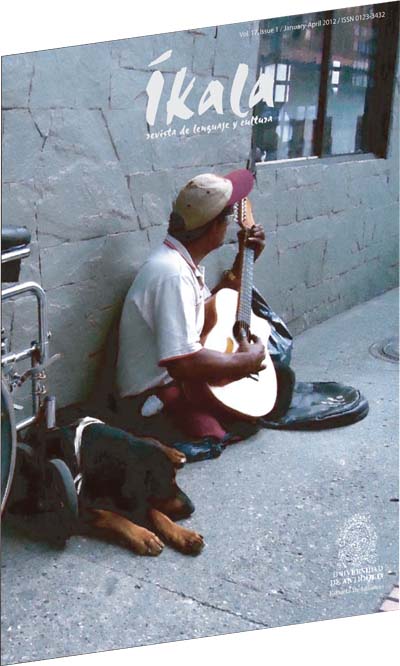The English Teacher: His Beliefs about English Language Assessment at Primary, Secondary and Tertiary Levels
DOI:
https://doi.org/10.17533/udea.ikala.10039Keywords:
assessment, beliefs, English, teachers, educational levelsAbstract
The following paper aims at identifying beliefs about English language assessment from a group of thirty Chilean teachers from primary, secondary and tertiary levels. This research is a multiple case study that utilizes a semi-structured interview, journals and a Likert scale, whose data are analyzed through semantic content analysis with the use of the qualitative data analysis software Atlasti that helps to determine participants' beliefs about assessment. The conclusions indicate that the participants declare to hold a communicative assessment model; however, written tests predominate as assessment procedures to assess grammar and vocabulary in the three educational levels.
Downloads
References
Ahumada, P. (2001). La evaluación en una concepción de aprendizaje significativo. Valparaíso, Chile: Ediciones Universitarias de Valparaíso.
Albert, M. (2007). La investigación educativa. Madrid, España: Claves Teóricas.
Alvarez, J. (2000). Didáctica, currículum y evaluación. Ensayos sobre cuestiones didácticas. Madrid, España: Mino y Dávila Editores.
Andrés, G., & Echeverri, P. (2001). Pensamiento docente y práctica pedagógica. Una investigación sobre el pensamiento práctico de los docentes. Bogotá, Colombia: Magisterio.
Borg, S. (2003). Teacher cognition in language teaching: A review of research on what language teachers think, know, believe, and do. The International Abstracting Journal for Language Teachers and Applied Linguists, 36, 81-109.
Brown, D. (2004). Language assessment. Principles and classroom practices. San Francisco, Estados Unidos: Longman.
Camps, A. (2001). El aula como espacio de investigación y reflexión. Investigaciones en didáctica de la lengua. Barcelona, España: Graó.
Coombe, Ch., Folse, K., & Hubley, N. (2007). A practical guide to assessing English language learners. Míchigan, Estados Unidos: Michigan Teacher Training.
Creswell, J. (2003). Research design. Qualitative, quantitative and mixed methods and approaches. Londres, Inglaterra: Sage Publications.
Dean-Brown, J., & Rodgers, T. (2002). Doing second language research. Oxford, Inglaterra: Oxford University Press.
Graves, K. (2000). Designing language courses. Boston, Estados Unidos: Heinle and Heinle.
Hamel, F. (2003). Teacher understanding of student understanding: Revising the gap between teacher conceptions and students' ways with literature. Research in the Teaching of English, 38, 49-84.
Hashweh, M. (2005). Teacher pedagogical constructions: A reconfiguration of pedagogical content knowledge. Teachers and Thinking: Theory and Practice, 11, 273-292.
Hashemnezhad, H., & Maftoon, P. (2011). An evaluation of English language grammar for college students 1&2: An EAP coursebook evaluation. International Journal of English Linguistics, 1, 206-114.
Hearn, I., & Garcés, A. (2003). Didáctica del inglés. Madrid, España: Pearson
Practice Hall.
Macaro, E. (2003). Teaching and learning a second language. A guide to recentresearch and its pplications. Nueva York, Estados Unidos: Continuum.
Muchmore, J. (2004). A Teachers' life. San Francisco, Estados Unidos: Backalong Books.
Nezakatgoo, B. (2011). Portfolio as a viable alternative in writing assessment. Journal of Language Teaching and Research, 2, 747-756.
Sandín, M. (2003). Investigación cualitativa en educación. Fundamentos y tradiciones. Madrid, España: Mc Graw Hill.
Sánchez, L., & Morrison-Saunders, A. (2010). Professional practice. Teaching impact assessment: Results of an international survey. Impact Assessment and project appraisal, 28, 245–250.
Scrivener, J. (2005). Learning teaching. Oxford, Inglaterra: Macmillan Heinemann.
Spratt, M., Pulverness, A., & Williams, M. (2005). The teaching knowledge test course. Cambridge, Inglaterra: Cambridge University Press.
Tsui, A. (2003). Understanding expertise in teaching. Cambridge, Inglaterra: Cambridge University Press.
Wang, L., & Huan, F. (2011). A self-evaluation of classroom language used when teaching grammar. International Education Studies, 4, 170-174.
Wilkinson, D., & Birmingham, P. (2003). Using research instruments. A guide for researchers. Londres, Inglaterra: Routledge Falmer.
Downloads
Published
How to Cite
Issue
Section
License
Copyright (c) 2012 Íkala, Revista de Lenguaje y Cultura

This work is licensed under a Creative Commons Attribution-NonCommercial-ShareAlike 4.0 International License.












